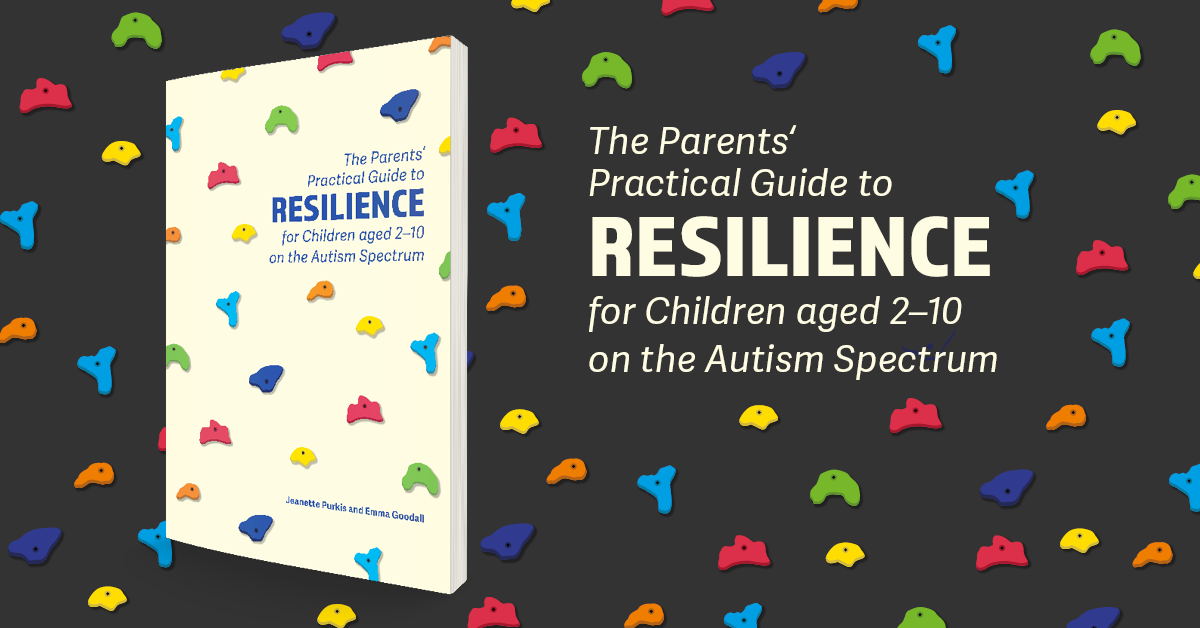All children need help to bounce back from life’s challenges, but having autism can sometimes make this more difficult. Building resilience and independence in children with autism can be hugely beneficial in helping them live an independent and rewarding life. Dr Emma Goodall and Jeanette Purkis have written The Parents’ Practical Guide to Resilience for Children aged 2-10 on the Autism Spectrum to help parents, teachers and carers support and empower the young people in their lives.
Parents of autistic children can worry about their child’s future. Parents are often given a long list of the barriers to their autistic child’s potential, or even told that their child will not finish school, get a job or live the kind of life parents tend to want for their children. Whilst well supported autistic adults usually achieve a happy and fulfilled life, many autistic people can struggle to find their confidence and resilience to respond to every day events.
This book is written by two autistic professionals with a passion for empowering autistic people and their families to live the best life they can. It shows parents how they can work alongside their autistic child to help them grow into an autistic adult with the necessary resilience, confidence and self-esteem to navigate the world well.
A lack of resilience is sometimes wrongly used as an excuse to blame autistic children for things beyond their control, such as bullying, but that has nothing to do with resilience. Resilience is in fact something autistic children and adults can benefit from greatly as it helps them address perfectionism, anxiety around change and fear of failing. It also provides practical activities to help parents equip their autistic children with the skills they need for a more fulfilled and positive future.
To celebrate the release of our new book, The Parents’ Practical Guide to Resilience for Children aged 2-10 on the Autism Spectrum we have described our five top tips for parents on developing resilience in their autistic child:
- Accept your autistic child as they are. Focus supports on helping them achieve their potential as autistic people rather than trying to ‘fix’ their autism. You cannot ‘fix’ autism and attempts to do so – such as forcing eye contact or stopping them ‘stimming’ – are likely to do a lot more harm than good. Starting from the position that autism is an integral part of your child’s character and identity, then building resilience will help them be the best ‘them’ they can be.
- Start from a place of safety. Building resilience needs to start from a solid base. A child needs to have a place they can go to – physically or through their imagination and memory – where they feel safe, supported and have some sense of control and agency. Parents can help create this kind of environment for their child. Self-confidence and, through it resilience, often begins when the child has their own ‘place of safety’. Most people are more confident when surrounded by people who believe in them and when they have a positive sense of self and a belief in themselves as capable people. These things are, in themselves, a ‘place of safety’. Ideally, this place of safety established in the home can be extended from home to the school environment, with the classroom teacher being a strong support.
- Controlled challenges. The key to building resilience for anybody is to face challenges and difficulties and overcome them. The key to building resilience with children and young people – including those on the autism spectrum – is to introduce a series of controlled challenges to help them incrementally take on slightly larger challenges and build their resilience. It can help to view resilience as a muscle that can be developed and grown through the ‘exercise’ of taking on new challenges. As the child masters one challenge, they will ideally build their strength to take on the next.
- Failing successfully. Being able to fail well is an essential life skill for everyone. Not being traumatised by making a mistake but instead acknowledging it and moving on is a very useful strategy for being able to take on challenges, try new things and learn important lessons. Successful failing is a core element of building resilience and ‘bouncing back’ from setbacks. Failing successfully is a skill that autistic children can learn and that will help them build their independence. Being able to fail successfully is a great skill that translates into resilience across all elements of life.
- This final point is one that you are probably doing already. Believe in them. Trust that they can achieve their goals and walk with them on their journey. While the information in our book is practical and includes activities and information which will help parents and their autistic children along their resilience journey, when it comes down to it parents are usually the experts in their child’s life. The book equips you with useful tools and strategies but starting from the belief that parents’ judgement, support and knowledge of their child is the basis from which all these strategies can grow.
If you would like to read more articles like this and get the latest news and offers on our books about autism, why not join our mailing list? We can send information by email or post as you prefer. You may also be interested in liking our Autism, Asperger’s and related conditions Facebook page.

Yes please,would be very interested.Work with kids on the spectrum from 3 to 21.Thanks😊
That’s great, thank you! You can sign up by following this link – https://intl.jkp.com/uk/mailing – and filling in the details.
I would like to join your mailing list. Thanks
That’s great, thank you! You can sign up by following this link – https://intl.jkp.com/uk/mailing – and filling in the details.
Where can I purchase this book please?
Hi Julie, the book is available to buy from our website, here – http://bit.ly/2zYdZR1
Thanks!